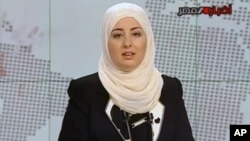CAIRO — A long-standing ban against veiled women newscasters on Egyptian state TV was lifted over the weekend, following a decision by the new Islamist-dominated government's top media official. It was a decision that drew applause from women who wear the veil, and condemnation from others who adhere to a more secular society.
Fatma Nabil, the new veiled TV anchor, was shown delivering the afternoon newscast with a male anchor on Egypt's Channel One station.
Egyptian Information Minister Salah Abdel Maksoud, who belongs to the politically influential Muslim Brotherhood, told the press Saturday that more veiled women announcers were being recruited by state TV, after secular-leaning regimes banned them for decades.
Video: Dress shop assistant Youssra Magdi Abou Zeid discusses her views on wearing of veil by TV anchors
VOA video from Cairo by Elizabeth Arrott, Japhet Weeks
A majority of Egyptian women wear some form of a veil during daily life. That trend has become much more marked since the late 1970s, according to analyst Khattar Abou Diab, who teaches political science at the University of Paris.
He says the Islamic trend in society began in the 1970s under former President Anwar Sadat and is rising now that the Muslim Brotherhood has come to power. He says that Egypt is giving more place to Islam, unlike the more liberal Egypt of the 1940s, '50s and '60s.
Abou Diab says that Egypt is “at the crossroads of the Sunni and Shi'ite worlds,” and its Islamic dress “blends aspects of both of those worlds.”
Said Sadek, who teaches political sociology at the American University in Cairo, says the decision to allow women journalists to wear the veil on TV is a “sign of respect for human rights.”
Sadek says that the former regime of ex-President Hosni Mubarak banned veiled-women announcers on state TV because it felt that “rural women were looking at the TV anchors as role models.” The old regime, he says, “was afraid that veiled TV anchors would spread the veil movement in society.”
Veteran Egyptian editor Hisham Kassem says the decision to allow veiled women newscasters upholds individual liberties. But he says that state television production costs Egyptian taxpayers a great deal and that media officials would do better to focus on content rather than on appearances.
Most Arab satellite channels allow women anchors to wear Islamic veils. Some Arab media organizations, however, try to discourage the trend by not hiring women who are already veiled.
Fatma Nabil, the new veiled TV anchor, was shown delivering the afternoon newscast with a male anchor on Egypt's Channel One station.
Egyptian Information Minister Salah Abdel Maksoud, who belongs to the politically influential Muslim Brotherhood, told the press Saturday that more veiled women announcers were being recruited by state TV, after secular-leaning regimes banned them for decades.
Video: Dress shop assistant Youssra Magdi Abou Zeid discusses her views on wearing of veil by TV anchors
VOA video from Cairo by Elizabeth Arrott, Japhet Weeks
A majority of Egyptian women wear some form of a veil during daily life. That trend has become much more marked since the late 1970s, according to analyst Khattar Abou Diab, who teaches political science at the University of Paris.
He says the Islamic trend in society began in the 1970s under former President Anwar Sadat and is rising now that the Muslim Brotherhood has come to power. He says that Egypt is giving more place to Islam, unlike the more liberal Egypt of the 1940s, '50s and '60s.
Abou Diab says that Egypt is “at the crossroads of the Sunni and Shi'ite worlds,” and its Islamic dress “blends aspects of both of those worlds.”
Said Sadek, who teaches political sociology at the American University in Cairo, says the decision to allow women journalists to wear the veil on TV is a “sign of respect for human rights.”
Sadek says that the former regime of ex-President Hosni Mubarak banned veiled-women announcers on state TV because it felt that “rural women were looking at the TV anchors as role models.” The old regime, he says, “was afraid that veiled TV anchors would spread the veil movement in society.”
Veteran Egyptian editor Hisham Kassem says the decision to allow veiled women newscasters upholds individual liberties. But he says that state television production costs Egyptian taxpayers a great deal and that media officials would do better to focus on content rather than on appearances.
Most Arab satellite channels allow women anchors to wear Islamic veils. Some Arab media organizations, however, try to discourage the trend by not hiring women who are already veiled.




